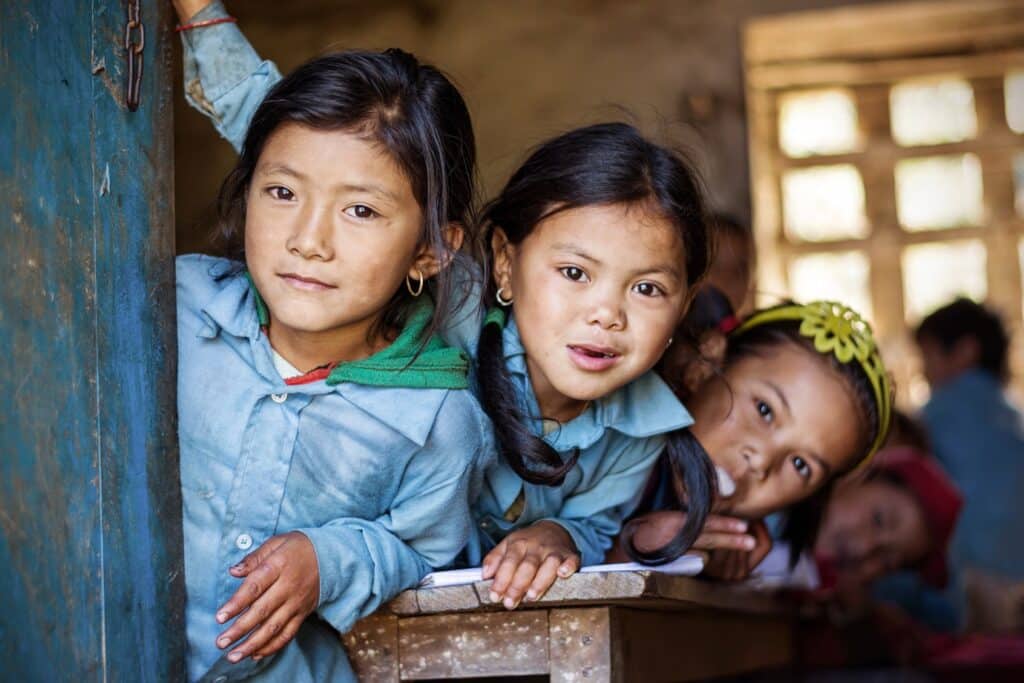Climate change is having a profound impact on girls’ education across Asia Pacific, including in Australia, according to a new youth-led study being presented at COP28 this week by Plan International.
The study’s findings are outlined in the For Our Futures report, which was co-researched by young people in Plan International’s Youth Activist Series’ across Australia, Nepal and Indonesia.
The research comes as more than 20 schools were closed in NSW, Australia, on Friday, due to the current heatwave impacting the state and the risk of bushfires.
The study consulted more than 500 people aged between 10-24 (the majority being girls) from Australia, Nepal and Indonesia about the ways that climate change is impacting their education. The research methodology involved a series of survey questions and a data collection method called photovoice, which enables people to share their views through photo and video content.
Researchers found that climate change and climate-induced disasters exacerbate the challenges girls already face. Research by the Malala Fund predicts that by 2025, climate change will be a contributing factor in preventing at least 12.5 million girls from completing their education each year.
Adding to the evidence base, the For Our Futures report revealed that 98 per cent of respondents were very concerned or somewhat concerned about how climate change is affecting their school life or how it will affect them in the future.
Sixty-two per cent of respondents had experienced disruptions to their travel to and from school due to climate change, and more than one in three had seen their school closed, damaged or destroyed due to climate change-related events.
Thirty-nine per cent were concerned about finding the job they want in the future because of the way climate change is impacting their education, and almost half of the respondents felt unsafe either at school or while travelling to school due to climate-related disasters.
“Less power to make decisions about my future,” was what 69 per cent of respondents in Australia said was one of the top concerns they had about how climate change was impacting their education.
Over 50 per cent of Indonesian respondents were concerned about climate change disrupting their academic performance.
And in Nepal, 25 per cent of respondents had their textbooks or learning materials damaged or destroyed, with one Nepali respondent saying that “even if you go to school, books and textbooks get wet when you are soaked in water … There is a different kind of weather than it used to be; sunny days in rainy season and no rainfall in rainy season or no water because of rise in temperature”.
“We won’t cop it”, said Plan International Australia 2023 Youth Activist Georgia Shakeshaft, regarding the climate injustice her generation faces.
“Working on the For Our Futures report, I got to see how badly climate change is affecting my peers– in Australia, and overseas in Indonesia and Nepal,” she said, adding that “some of the stories we heard were shocking.”
“We need to listen to the voices of girls and young people, who are experiencing the effects of climate change firsthand. The climate crisis is robbing so many young people around the world of a smooth education. We are being robbed of a future.”
Speaking on behalf of their generation, the youth activists are using the results to call on wealthy countries like Australia to commit to the Loss and Damage Fund to support the most vulnerable in dealing with the climate crisis.
Climate change is not gender neutral
The climate crisis “is impacting girls first and worst”, said Susanne Legena, Plan Australia’s CEO, adding that this is particularly true for girls in the poorest countries, who are “least responsible for climate change”.
Household responsibilities become intensified by climate change, meaning that girls who most often take these on have less time to attend school. Water scarcity also makes it difficult for girls to manage their periods safely and with dignity at school.
One in two survey respondents wanted girls to be taught more about how to prepare for disasters.
Legena described the climate crisis as “an intergenerational and gender injustice”. She says the For Our Futures report highlights the resilience and agency of young people.
“Girls around the world are taking collective action to advance climate justice, and we are working with these girls and their communities to reduce climate risks, adapt to climate change, strengthen resilience, promote girls’ leadership and increase their political empowerment.”
Loss and damage fund
As the world’s most influential climate experts convene for another week in Dubai for COP28, two of the Plan International Youth Activists who worked on the report – Georgia Shakeshaft and Iremide Ayonrinde— will present the For Our Futures report at the international climate conference.
Shakeshaft and Ayonrindw will make three specific recommendations, which include calling on the Australian Government to make a commitment at COP28 to contribute to the UNFCCC Loss and Damage fund. This fund aims to to support the most vulnerable and poorest countries to keep up with the rising costs associated with weather events related to climate change.
They will also call for ‘disruption to education’ to be recognised as a specific form of non-economic loss that should be recognised by the UNFCCC Loss and Damage fund.
Finally, they will call for the establishment of a National Council of Young Women on Climate to amplify diverse voices, focus on young women with lived experience of the impacts of climate change and enable direct communication between young women and decision-makers.
Echoing their calls, Legena said the youth activists’ agency gives them hope for their futures. But she added that wealthy countries such as Australia, along with big polluters, must take responsibility and step up to take meaningful action by committing to the loss and damage fund.


